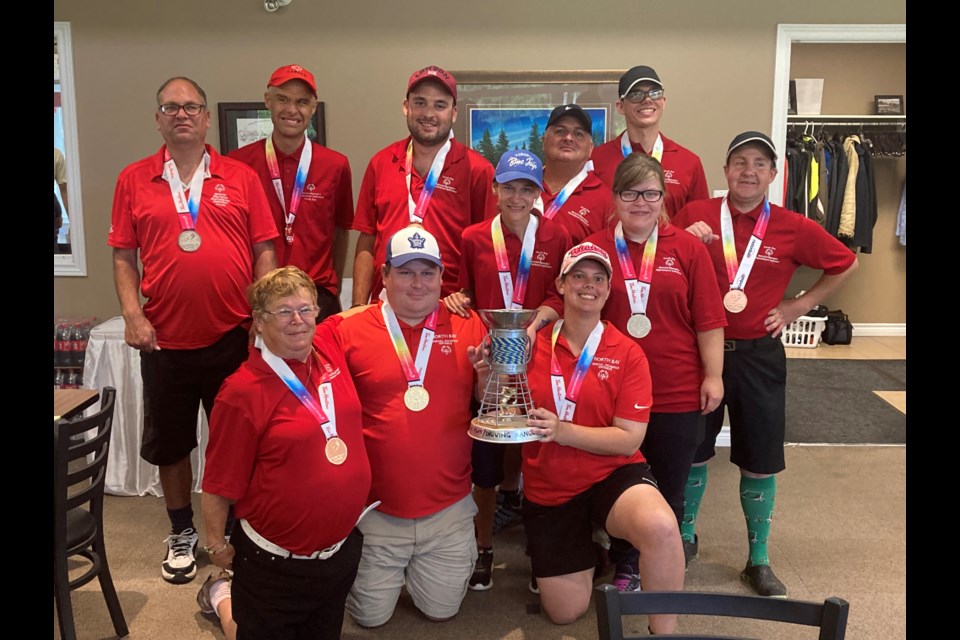Special Olympics golfers wore broad smiles as they honed their driving and putting skills at Osprey Links Golf Course in Callander Tuesday.
The tournament saw 11 athletes, each with their own partner and caddy, trying to beat the course, vying for a gold, silver, or bronze medal.
The athletes thoroughly enjoyed getting back into their sport after being sidelined for the past few years.
“It’s unreal. Their social circle and their professional circle is not huge for people with intellectual disabilities. So almost all of their friends and the people they work with are all part of Special Olympics, so they’re getting a chance to be with their friends and not sit in their apartments by themselves,” said Glen Cundari, head coach of the North Bay Special Olympics golf program.
“The sport part is important, but I’m just so pleased that they’re happy to be out.”
The tournament was part of Special Olympics Ontario Hometown Games events.
As Abby Zalewski, Hometown Games PR Team Lead explains, Hometown Games is an initiative to try to get communities back to sports.
“Back to competition, even just back to practice in person because everything has been virtual or even just on pause for the past two years,” said Zalewski.
“Hometown Games is very adaptable. It is easily tailored to the individual community and their needs.”
Zalewski says what makes Hometown Games unique, is its flexibility.
“We’ve seen competitions that have over 220 athletes and we have competitions that have 20 athletes. And we are okay with that. Our goal is to just get these athletes back on the field or back on the courts or whatever it may be, back in person with their peers, back to sports,” noted Zalewski.
“The community hosts really have full autonomy regarding the scale of the events. We’ve had two teams play a soccer game against each other and we’ll give them medals and call it a tournament and that’s fantastic. Over the weekend we had a softball tournament in Durham. We had 16 teams. Amazing. Whatever works. We’re really just looking to support the communities on their return to competition,” explained Zalewski who went on to say Hometown Games are open to all registered members of Special Olympics.
There is no cap on the number of competitions a community can host.
“For example, London has already hosted four or five Hometown Games. They’re a bigger organization and they know what they’re doing basically. Again, totally up to the community,” said Zalewski.
“So in the summer, there’s five sports; golf, soccer, softball, bocce, and track and field. In winter there are a lot more sports, it depends on the region. Somewhere like North Bay would be able to offer sports like snowshoeing or alpine skiing. We have swimming, power-lifting, basketball, floor hockey and bowling. A lot of our athletes compete in multiple sports.”
Returning participant levels have fluctuated since the start of COVID.
“It has been hit and miss. The athletes are super eager to get back out. There has been some hesitation to return to in-person stuff, which is of course, valid,” Zalewsiki stated.
“But we were really pushing for the summer sports because most of them are outdoors so if we can get people to start coming to these summer ones, we’re hoping that they will be more comfortable returning to the indoor sports come the fall and the winter.”
She went on to say the biggest challenge has been getting the volunteers to come back.
“We had a very good volunteer base pre-COVID, but post-COVID has been a bit of a struggle. So that would be the main thing. Some communities haven’t even been able to host tournaments because they haven’t found enough volunteers. I’ve been having to put posts on social media to try to get more volunteers.”
Cundari says North Bay is doing well when it comes to volunteer recruitment.
“I think for us who live in this region, I think we’re generally pretty proud of that in terms of our volunteer base. We have 27 volunteers here today for 11 athletes. So every athlete has a partner and a caddy plus the people who are running the event,” said Cundari.
“There’s no question post-COVID getting coaches for our day-to-day program, we did lose some coaches but other people have stepped up so it’s not without challenges but it hasn’t been a huge stress for us.”
One of the athletes reaping the benefits of the program is Carley Tucker who finished the nine-hole tournament with a silver medal.
“My partner Dan and I did really well. We beat our score from 2019. Last time in 2019 we shot a 58 and we knocked it down to a 54 today. And we got a silver medal,” said a proud Tucker.
“I like golf a lot. It is a lot of fun for Special Olympics. It is pretty fun to see how much we have improved after a few years. I’ve been out on the golf course just a couple of times this summer with my two best friends. I will definitely be back next year. “
